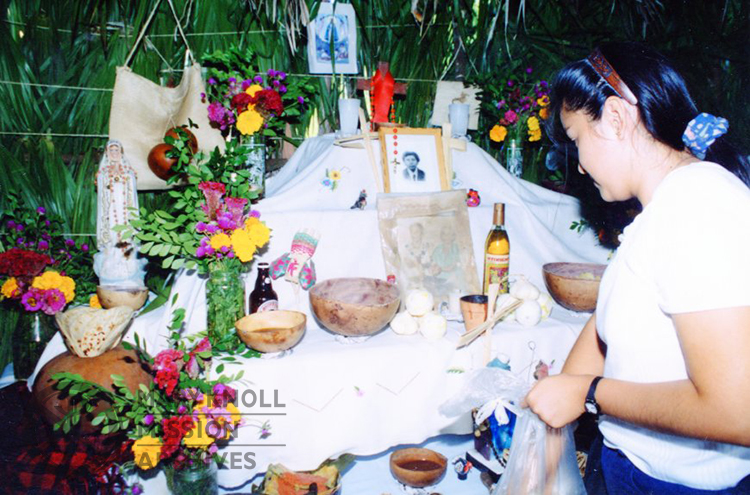El Día de los Muertos (Day of the Dead) is a Mexican indigenous festivity that “commemorates the transitory return to Earth of deceased relatives and loved ones…Families facilitate the return of the souls to Earth by laying flower petals, candles and offerings along the path leading from the cemetery to their homes.” [Taken from the UNESCO Intangible Cultural Heritage lists] Day of the Dead is celebrated between October 31 and November 2.
Reading through the Maryknoll Lay Missioner Newsletters collection I came across this entry from Kathy Bond, who was missioned in Brazil. In her December 1997 newsletter to friends and family she detailed experiencing Day of the Dead celebrations while traveling in Mexico:
“Another bonus was being in Mexico for All Soul’s Day – Day of the Dead. Indians and Mestizos who celebrate the Fiesta of the Dead believe the souls of the dead return each year to visit their living relatives. The relatives provide a feast of the deceased’s favorite food and booze. Mexicans look upon dying as…the ultimate liberation. They joke about it. In popular art, the figure of Death is described in irony, which expresses the joy and pain of humankind. At the fiesta, friends exchange candy skulls. A week after the fiesta, we accompanied a Mexican family to the cemetery for a typical meal in thanksgiving to the ancestors who had left their gravesites to visit the living. As we arrived, people were buying bundles of flowers especially marigolds to decorate the graves. As the sun disappeared behind the mountain, Mariachi bands roamed around the cemetery in a vibrant tribute to both the dead and the living who were feasting on chicken and spicy green sauce tortillas along with shots of tequila. When the band arrived at our family’s gathering, all enjoyed the site of Shayne, 5 year old son of Maryknollers living in Oaxaca, directing them orchestra-style.”
Kathy Bond continues her mission work in Brazil, focusing her ministry on health and human rights leadership formation for women in marginalized communities. To learn more about Kathy’s work, please click here.

